Applying System Thinking to Obesity in Public Health (PUBH6003)
VerifiedAdded on 2022/08/20
|9
|1951
|9
Report
AI Summary
This report, prepared by a student, examines obesity as a critical public health issue, employing a system-based approach to understand its complexities. The report begins with an executive summary highlighting the key aspects of obesity, its associated health risks, and the purpose of applying system thinking and an intersectoral approach. The introduction defines obesity, its causes, and its impact, emphasizing its status as a preventable cause of death. The body of the report delves into the medical condition of obesity, its diagnosis, and the health issues it causes, such as cardiovascular disease and type 2 diabetes. It references WHO guidelines and Australian statistics to illustrate the prevalence and challenges of obesity. The report identifies the challenges in implementing a system-based approach, including modeling behavioral shifts and marketing food with better nutritional value. It then lists key stakeholders, including government bodies, international organizations, the private sector, and civil society, and details their respective roles in obesity prevention. The report emphasizes the need for collaboration among stakeholders and the challenges in reconciling differing values. The report explains a system approach, its complexities, and the importance of multidisciplinary teams. It outlines the steps for implementing a system-based approach, including mapping the system, conducting experiments, designing policies, and updating models. The conclusion summarizes the findings, emphasizing the importance of stakeholder collaboration and providing recommendations to reduce obesity, such as reducing sugar intake, increasing physical activity, and promoting nutritious food. The report concludes with a justification based on literature and a list of references.
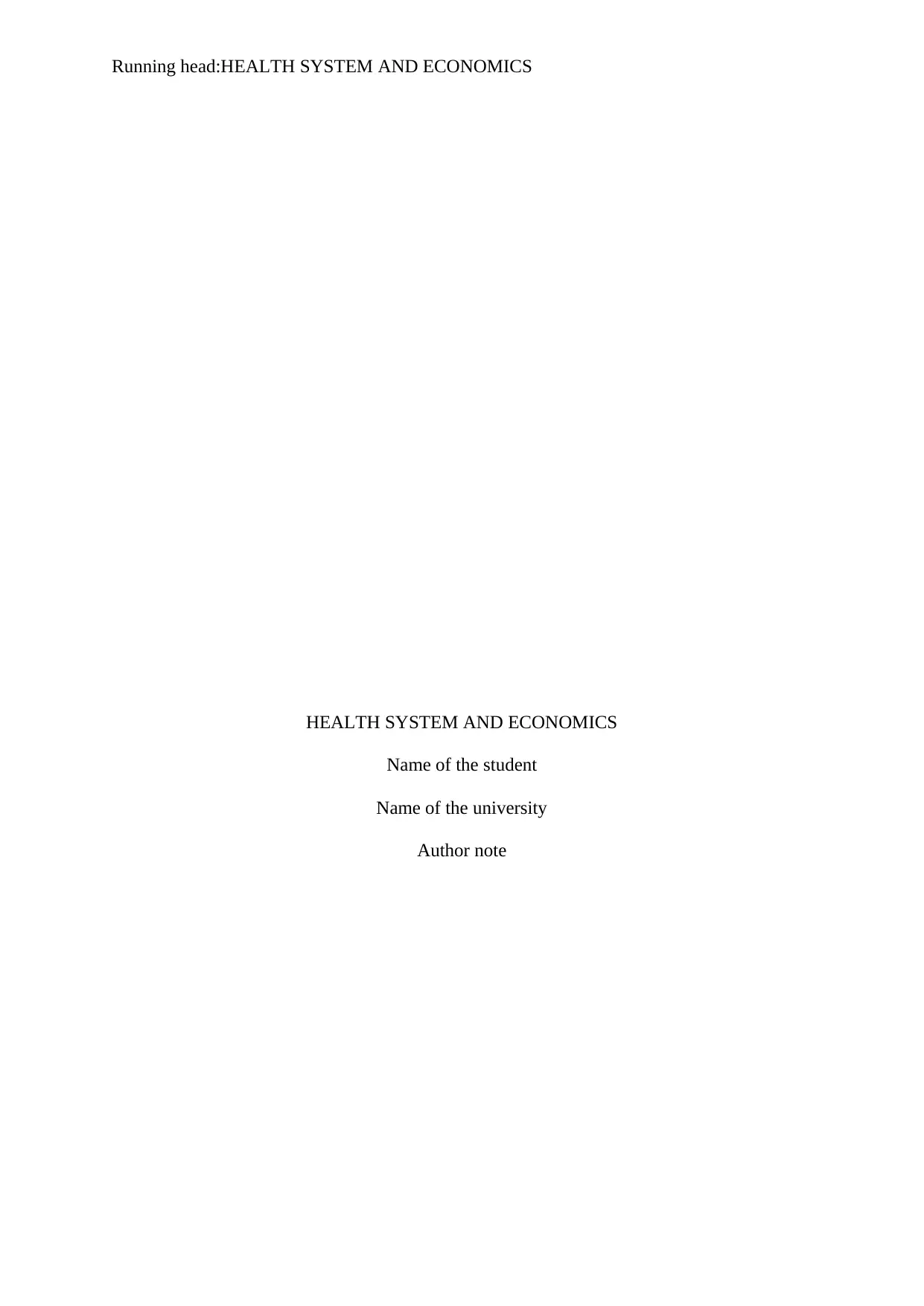
Running head:HEALTH SYSTEM AND ECONOMICS
HEALTH SYSTEM AND ECONOMICS
Name of the student
Name of the university
Author note
HEALTH SYSTEM AND ECONOMICS
Name of the student
Name of the university
Author note
Paraphrase This Document
Need a fresh take? Get an instant paraphrase of this document with our AI Paraphraser
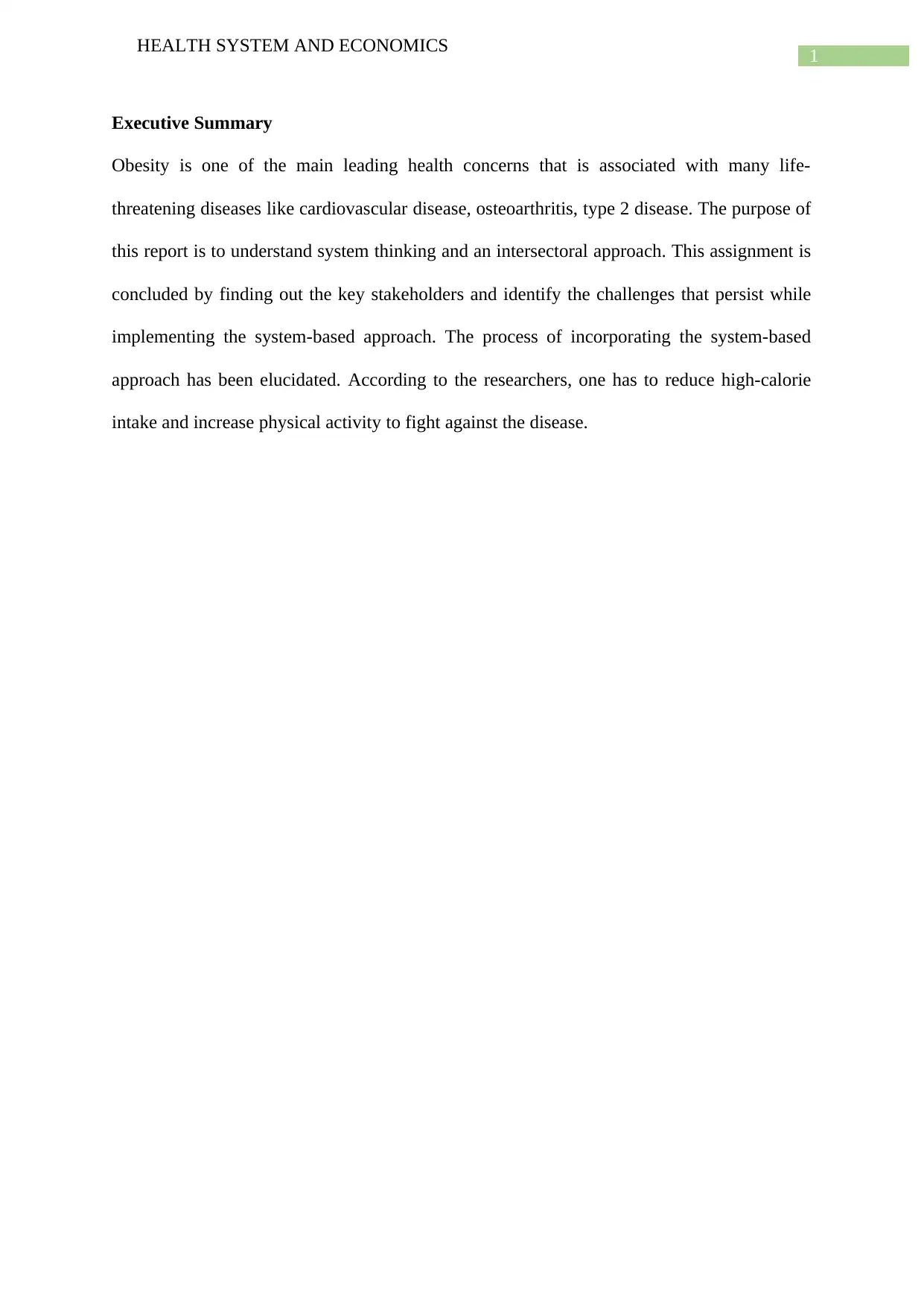
1
HEALTH SYSTEM AND ECONOMICS
Executive Summary
Obesity is one of the main leading health concerns that is associated with many life-
threatening diseases like cardiovascular disease, osteoarthritis, type 2 disease. The purpose of
this report is to understand system thinking and an intersectoral approach. This assignment is
concluded by finding out the key stakeholders and identify the challenges that persist while
implementing the system-based approach. The process of incorporating the system-based
approach has been elucidated. According to the researchers, one has to reduce high-calorie
intake and increase physical activity to fight against the disease.
HEALTH SYSTEM AND ECONOMICS
Executive Summary
Obesity is one of the main leading health concerns that is associated with many life-
threatening diseases like cardiovascular disease, osteoarthritis, type 2 disease. The purpose of
this report is to understand system thinking and an intersectoral approach. This assignment is
concluded by finding out the key stakeholders and identify the challenges that persist while
implementing the system-based approach. The process of incorporating the system-based
approach has been elucidated. According to the researchers, one has to reduce high-calorie
intake and increase physical activity to fight against the disease.
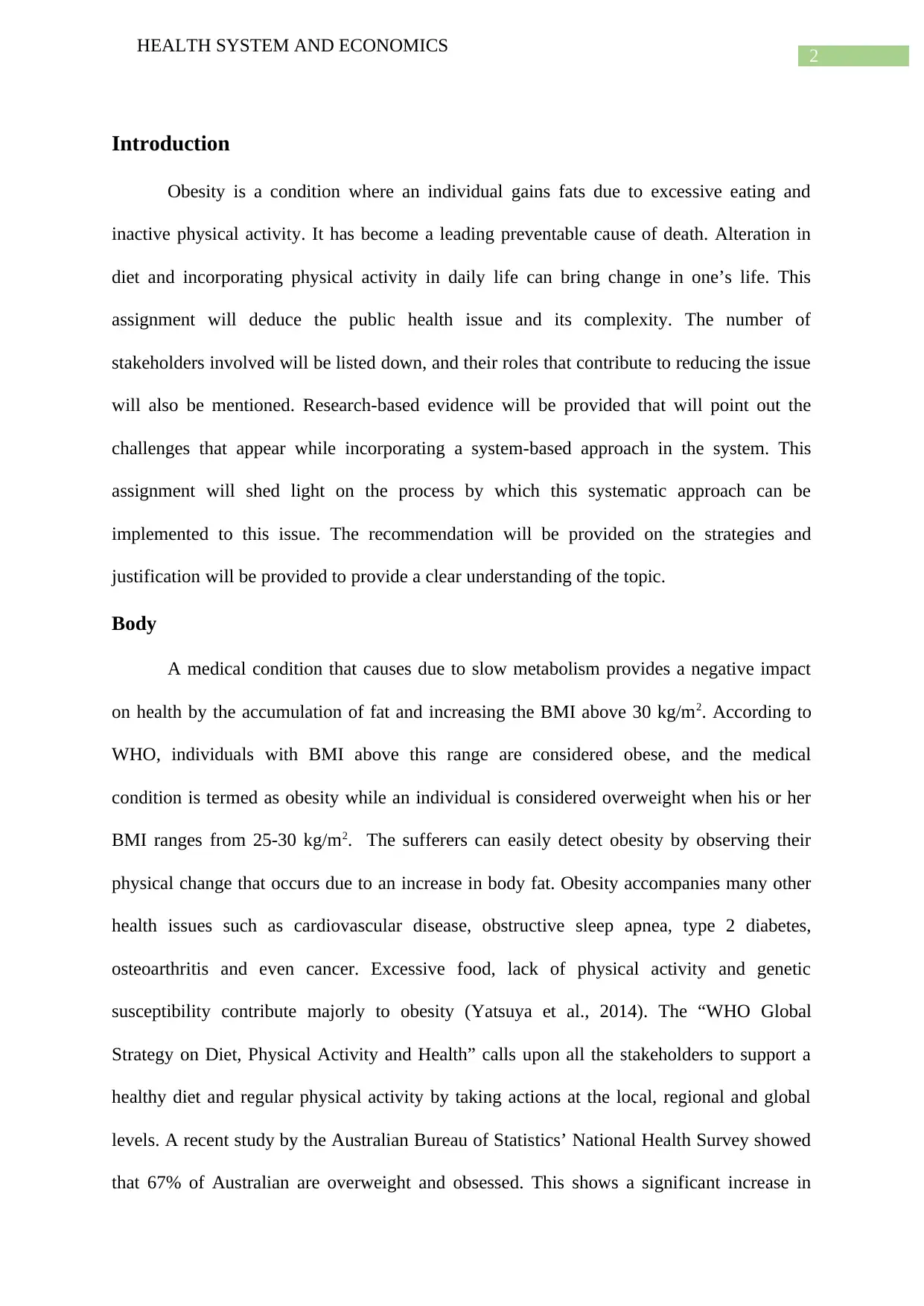
2
HEALTH SYSTEM AND ECONOMICS
Introduction
Obesity is a condition where an individual gains fats due to excessive eating and
inactive physical activity. It has become a leading preventable cause of death. Alteration in
diet and incorporating physical activity in daily life can bring change in one’s life. This
assignment will deduce the public health issue and its complexity. The number of
stakeholders involved will be listed down, and their roles that contribute to reducing the issue
will also be mentioned. Research-based evidence will be provided that will point out the
challenges that appear while incorporating a system-based approach in the system. This
assignment will shed light on the process by which this systematic approach can be
implemented to this issue. The recommendation will be provided on the strategies and
justification will be provided to provide a clear understanding of the topic.
Body
A medical condition that causes due to slow metabolism provides a negative impact
on health by the accumulation of fat and increasing the BMI above 30 kg/m2. According to
WHO, individuals with BMI above this range are considered obese, and the medical
condition is termed as obesity while an individual is considered overweight when his or her
BMI ranges from 25-30 kg/m2. The sufferers can easily detect obesity by observing their
physical change that occurs due to an increase in body fat. Obesity accompanies many other
health issues such as cardiovascular disease, obstructive sleep apnea, type 2 diabetes,
osteoarthritis and even cancer. Excessive food, lack of physical activity and genetic
susceptibility contribute majorly to obesity (Yatsuya et al., 2014). The “WHO Global
Strategy on Diet, Physical Activity and Health” calls upon all the stakeholders to support a
healthy diet and regular physical activity by taking actions at the local, regional and global
levels. A recent study by the Australian Bureau of Statistics’ National Health Survey showed
that 67% of Australian are overweight and obsessed. This shows a significant increase in
HEALTH SYSTEM AND ECONOMICS
Introduction
Obesity is a condition where an individual gains fats due to excessive eating and
inactive physical activity. It has become a leading preventable cause of death. Alteration in
diet and incorporating physical activity in daily life can bring change in one’s life. This
assignment will deduce the public health issue and its complexity. The number of
stakeholders involved will be listed down, and their roles that contribute to reducing the issue
will also be mentioned. Research-based evidence will be provided that will point out the
challenges that appear while incorporating a system-based approach in the system. This
assignment will shed light on the process by which this systematic approach can be
implemented to this issue. The recommendation will be provided on the strategies and
justification will be provided to provide a clear understanding of the topic.
Body
A medical condition that causes due to slow metabolism provides a negative impact
on health by the accumulation of fat and increasing the BMI above 30 kg/m2. According to
WHO, individuals with BMI above this range are considered obese, and the medical
condition is termed as obesity while an individual is considered overweight when his or her
BMI ranges from 25-30 kg/m2. The sufferers can easily detect obesity by observing their
physical change that occurs due to an increase in body fat. Obesity accompanies many other
health issues such as cardiovascular disease, obstructive sleep apnea, type 2 diabetes,
osteoarthritis and even cancer. Excessive food, lack of physical activity and genetic
susceptibility contribute majorly to obesity (Yatsuya et al., 2014). The “WHO Global
Strategy on Diet, Physical Activity and Health” calls upon all the stakeholders to support a
healthy diet and regular physical activity by taking actions at the local, regional and global
levels. A recent study by the Australian Bureau of Statistics’ National Health Survey showed
that 67% of Australian are overweight and obsessed. This shows a significant increase in
⊘ This is a preview!⊘
Do you want full access?
Subscribe today to unlock all pages.

Trusted by 1+ million students worldwide
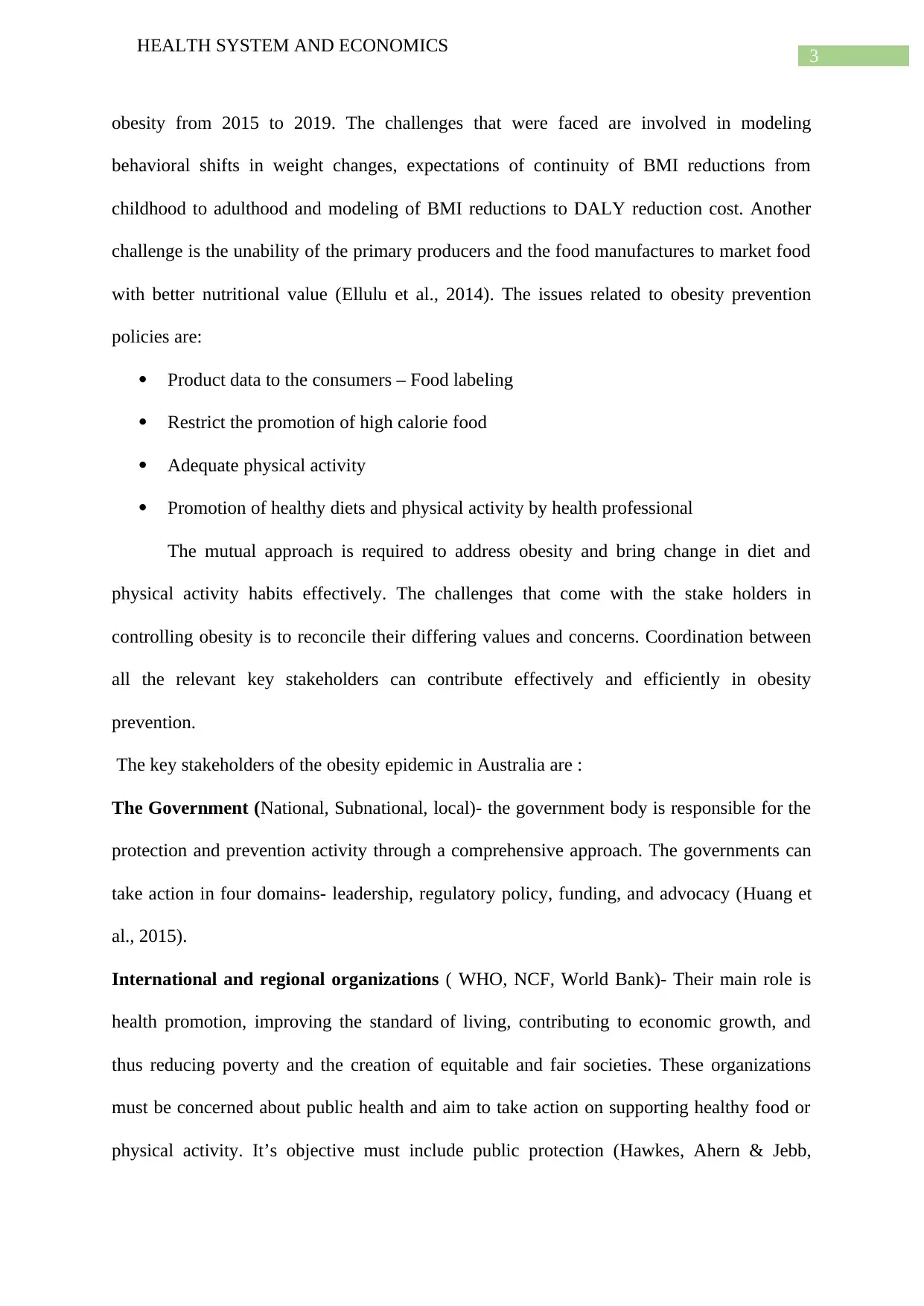
3
HEALTH SYSTEM AND ECONOMICS
obesity from 2015 to 2019. The challenges that were faced are involved in modeling
behavioral shifts in weight changes, expectations of continuity of BMI reductions from
childhood to adulthood and modeling of BMI reductions to DALY reduction cost. Another
challenge is the unability of the primary producers and the food manufactures to market food
with better nutritional value (Ellulu et al., 2014). The issues related to obesity prevention
policies are:
Product data to the consumers – Food labeling
Restrict the promotion of high calorie food
Adequate physical activity
Promotion of healthy diets and physical activity by health professional
The mutual approach is required to address obesity and bring change in diet and
physical activity habits effectively. The challenges that come with the stake holders in
controlling obesity is to reconcile their differing values and concerns. Coordination between
all the relevant key stakeholders can contribute effectively and efficiently in obesity
prevention.
The key stakeholders of the obesity epidemic in Australia are :
The Government (National, Subnational, local)- the government body is responsible for the
protection and prevention activity through a comprehensive approach. The governments can
take action in four domains- leadership, regulatory policy, funding, and advocacy (Huang et
al., 2015).
International and regional organizations ( WHO, NCF, World Bank)- Their main role is
health promotion, improving the standard of living, contributing to economic growth, and
thus reducing poverty and the creation of equitable and fair societies. These organizations
must be concerned about public health and aim to take action on supporting healthy food or
physical activity. It’s objective must include public protection (Hawkes, Ahern & Jebb,
HEALTH SYSTEM AND ECONOMICS
obesity from 2015 to 2019. The challenges that were faced are involved in modeling
behavioral shifts in weight changes, expectations of continuity of BMI reductions from
childhood to adulthood and modeling of BMI reductions to DALY reduction cost. Another
challenge is the unability of the primary producers and the food manufactures to market food
with better nutritional value (Ellulu et al., 2014). The issues related to obesity prevention
policies are:
Product data to the consumers – Food labeling
Restrict the promotion of high calorie food
Adequate physical activity
Promotion of healthy diets and physical activity by health professional
The mutual approach is required to address obesity and bring change in diet and
physical activity habits effectively. The challenges that come with the stake holders in
controlling obesity is to reconcile their differing values and concerns. Coordination between
all the relevant key stakeholders can contribute effectively and efficiently in obesity
prevention.
The key stakeholders of the obesity epidemic in Australia are :
The Government (National, Subnational, local)- the government body is responsible for the
protection and prevention activity through a comprehensive approach. The governments can
take action in four domains- leadership, regulatory policy, funding, and advocacy (Huang et
al., 2015).
International and regional organizations ( WHO, NCF, World Bank)- Their main role is
health promotion, improving the standard of living, contributing to economic growth, and
thus reducing poverty and the creation of equitable and fair societies. These organizations
must be concerned about public health and aim to take action on supporting healthy food or
physical activity. It’s objective must include public protection (Hawkes, Ahern & Jebb,
Paraphrase This Document
Need a fresh take? Get an instant paraphrase of this document with our AI Paraphraser
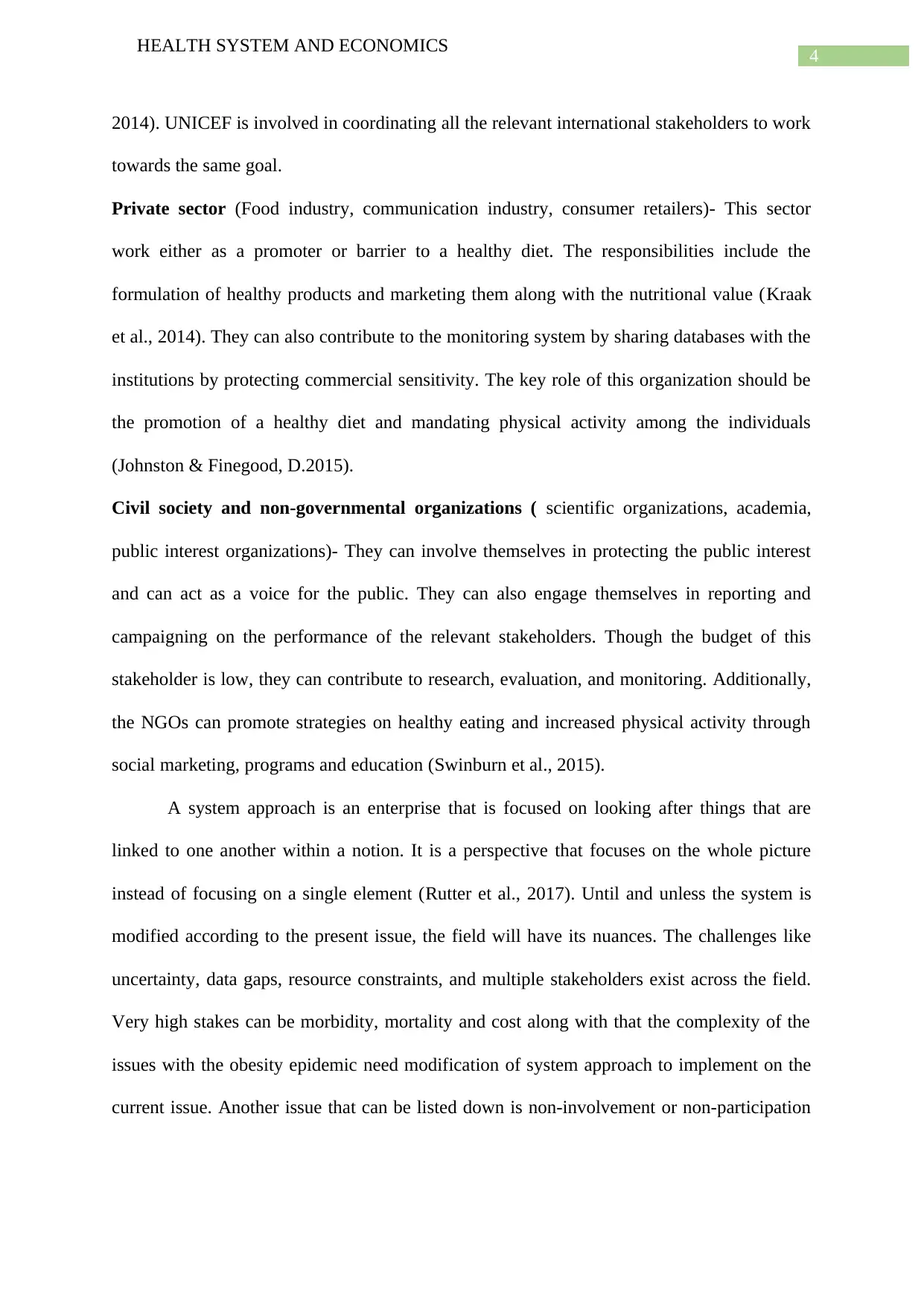
4
HEALTH SYSTEM AND ECONOMICS
2014). UNICEF is involved in coordinating all the relevant international stakeholders to work
towards the same goal.
Private sector (Food industry, communication industry, consumer retailers)- This sector
work either as a promoter or barrier to a healthy diet. The responsibilities include the
formulation of healthy products and marketing them along with the nutritional value (Kraak
et al., 2014). They can also contribute to the monitoring system by sharing databases with the
institutions by protecting commercial sensitivity. The key role of this organization should be
the promotion of a healthy diet and mandating physical activity among the individuals
(Johnston & Finegood, D.2015).
Civil society and non-governmental organizations ( scientific organizations, academia,
public interest organizations)- They can involve themselves in protecting the public interest
and can act as a voice for the public. They can also engage themselves in reporting and
campaigning on the performance of the relevant stakeholders. Though the budget of this
stakeholder is low, they can contribute to research, evaluation, and monitoring. Additionally,
the NGOs can promote strategies on healthy eating and increased physical activity through
social marketing, programs and education (Swinburn et al., 2015).
A system approach is an enterprise that is focused on looking after things that are
linked to one another within a notion. It is a perspective that focuses on the whole picture
instead of focusing on a single element (Rutter et al., 2017). Until and unless the system is
modified according to the present issue, the field will have its nuances. The challenges like
uncertainty, data gaps, resource constraints, and multiple stakeholders exist across the field.
Very high stakes can be morbidity, mortality and cost along with that the complexity of the
issues with the obesity epidemic need modification of system approach to implement on the
current issue. Another issue that can be listed down is non-involvement or non-participation
HEALTH SYSTEM AND ECONOMICS
2014). UNICEF is involved in coordinating all the relevant international stakeholders to work
towards the same goal.
Private sector (Food industry, communication industry, consumer retailers)- This sector
work either as a promoter or barrier to a healthy diet. The responsibilities include the
formulation of healthy products and marketing them along with the nutritional value (Kraak
et al., 2014). They can also contribute to the monitoring system by sharing databases with the
institutions by protecting commercial sensitivity. The key role of this organization should be
the promotion of a healthy diet and mandating physical activity among the individuals
(Johnston & Finegood, D.2015).
Civil society and non-governmental organizations ( scientific organizations, academia,
public interest organizations)- They can involve themselves in protecting the public interest
and can act as a voice for the public. They can also engage themselves in reporting and
campaigning on the performance of the relevant stakeholders. Though the budget of this
stakeholder is low, they can contribute to research, evaluation, and monitoring. Additionally,
the NGOs can promote strategies on healthy eating and increased physical activity through
social marketing, programs and education (Swinburn et al., 2015).
A system approach is an enterprise that is focused on looking after things that are
linked to one another within a notion. It is a perspective that focuses on the whole picture
instead of focusing on a single element (Rutter et al., 2017). Until and unless the system is
modified according to the present issue, the field will have its nuances. The challenges like
uncertainty, data gaps, resource constraints, and multiple stakeholders exist across the field.
Very high stakes can be morbidity, mortality and cost along with that the complexity of the
issues with the obesity epidemic need modification of system approach to implement on the
current issue. Another issue that can be listed down is non-involvement or non-participation
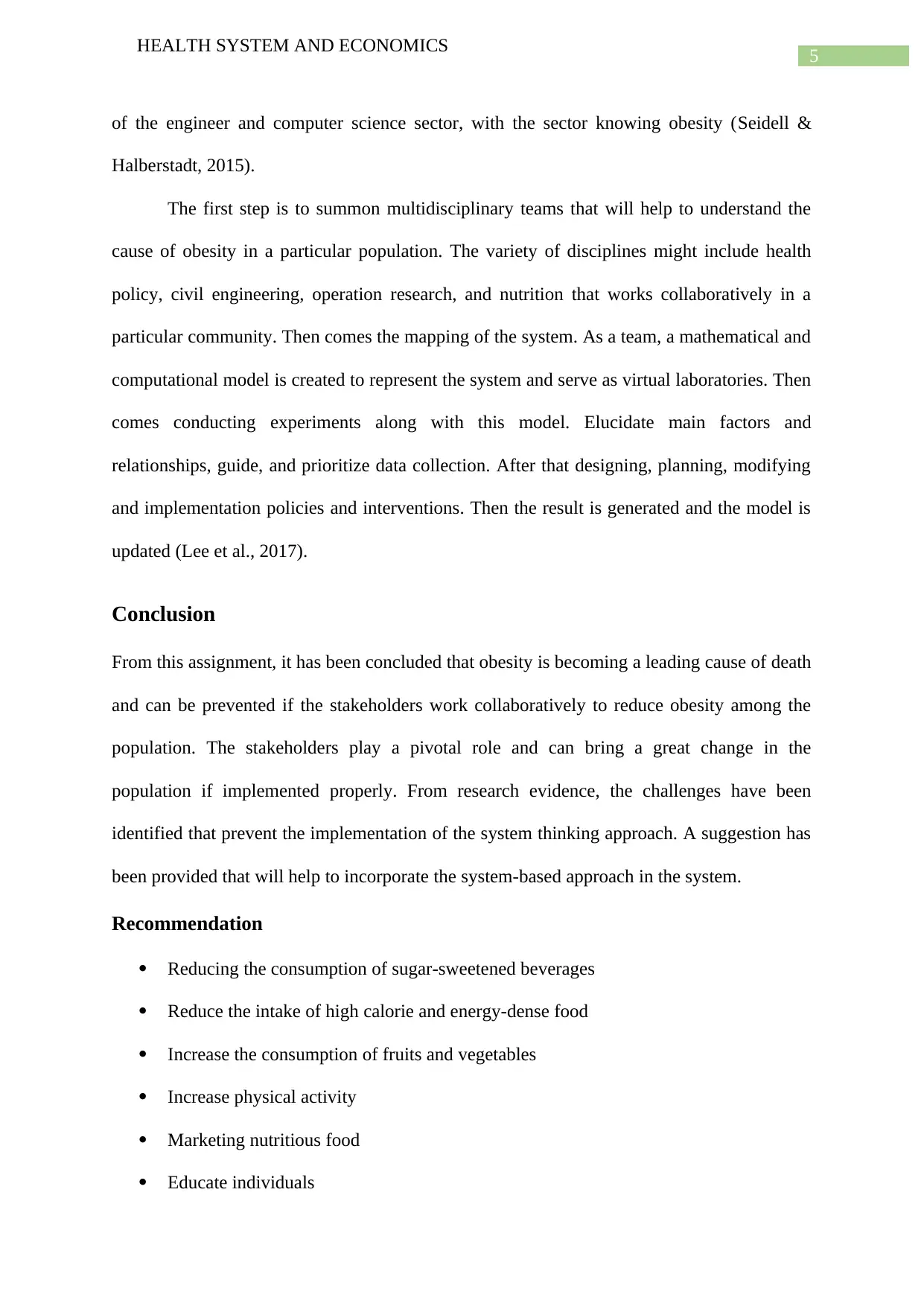
5
HEALTH SYSTEM AND ECONOMICS
of the engineer and computer science sector, with the sector knowing obesity (Seidell &
Halberstadt, 2015).
The first step is to summon multidisciplinary teams that will help to understand the
cause of obesity in a particular population. The variety of disciplines might include health
policy, civil engineering, operation research, and nutrition that works collaboratively in a
particular community. Then comes the mapping of the system. As a team, a mathematical and
computational model is created to represent the system and serve as virtual laboratories. Then
comes conducting experiments along with this model. Elucidate main factors and
relationships, guide, and prioritize data collection. After that designing, planning, modifying
and implementation policies and interventions. Then the result is generated and the model is
updated (Lee et al., 2017).
Conclusion
From this assignment, it has been concluded that obesity is becoming a leading cause of death
and can be prevented if the stakeholders work collaboratively to reduce obesity among the
population. The stakeholders play a pivotal role and can bring a great change in the
population if implemented properly. From research evidence, the challenges have been
identified that prevent the implementation of the system thinking approach. A suggestion has
been provided that will help to incorporate the system-based approach in the system.
Recommendation
Reducing the consumption of sugar-sweetened beverages
Reduce the intake of high calorie and energy-dense food
Increase the consumption of fruits and vegetables
Increase physical activity
Marketing nutritious food
Educate individuals
HEALTH SYSTEM AND ECONOMICS
of the engineer and computer science sector, with the sector knowing obesity (Seidell &
Halberstadt, 2015).
The first step is to summon multidisciplinary teams that will help to understand the
cause of obesity in a particular population. The variety of disciplines might include health
policy, civil engineering, operation research, and nutrition that works collaboratively in a
particular community. Then comes the mapping of the system. As a team, a mathematical and
computational model is created to represent the system and serve as virtual laboratories. Then
comes conducting experiments along with this model. Elucidate main factors and
relationships, guide, and prioritize data collection. After that designing, planning, modifying
and implementation policies and interventions. Then the result is generated and the model is
updated (Lee et al., 2017).
Conclusion
From this assignment, it has been concluded that obesity is becoming a leading cause of death
and can be prevented if the stakeholders work collaboratively to reduce obesity among the
population. The stakeholders play a pivotal role and can bring a great change in the
population if implemented properly. From research evidence, the challenges have been
identified that prevent the implementation of the system thinking approach. A suggestion has
been provided that will help to incorporate the system-based approach in the system.
Recommendation
Reducing the consumption of sugar-sweetened beverages
Reduce the intake of high calorie and energy-dense food
Increase the consumption of fruits and vegetables
Increase physical activity
Marketing nutritious food
Educate individuals
⊘ This is a preview!⊘
Do you want full access?
Subscribe today to unlock all pages.

Trusted by 1+ million students worldwide
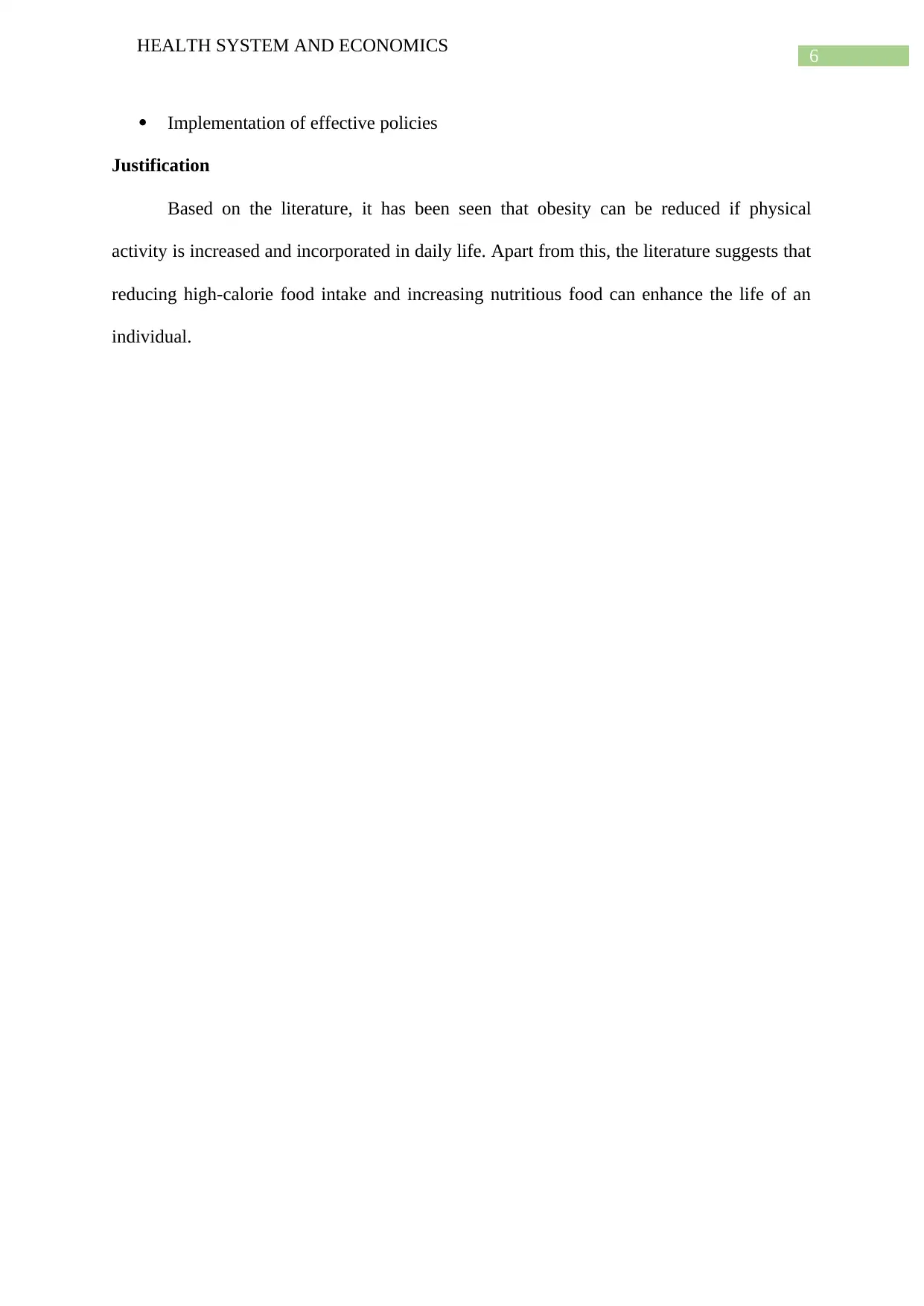
6
HEALTH SYSTEM AND ECONOMICS
Implementation of effective policies
Justification
Based on the literature, it has been seen that obesity can be reduced if physical
activity is increased and incorporated in daily life. Apart from this, the literature suggests that
reducing high-calorie food intake and increasing nutritious food can enhance the life of an
individual.
HEALTH SYSTEM AND ECONOMICS
Implementation of effective policies
Justification
Based on the literature, it has been seen that obesity can be reduced if physical
activity is increased and incorporated in daily life. Apart from this, the literature suggests that
reducing high-calorie food intake and increasing nutritious food can enhance the life of an
individual.
Paraphrase This Document
Need a fresh take? Get an instant paraphrase of this document with our AI Paraphraser
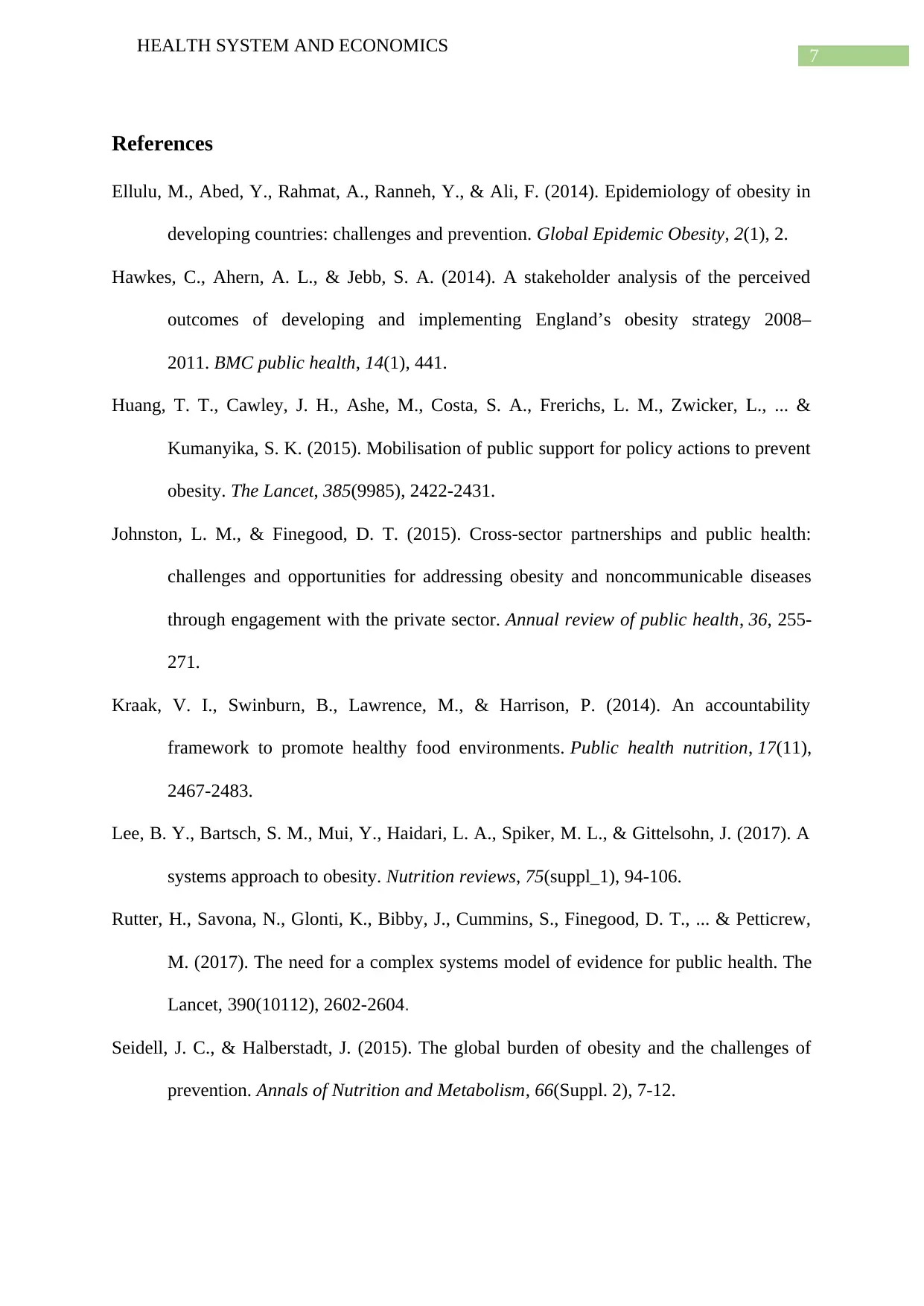
7
HEALTH SYSTEM AND ECONOMICS
References
Ellulu, M., Abed, Y., Rahmat, A., Ranneh, Y., & Ali, F. (2014). Epidemiology of obesity in
developing countries: challenges and prevention. Global Epidemic Obesity, 2(1), 2.
Hawkes, C., Ahern, A. L., & Jebb, S. A. (2014). A stakeholder analysis of the perceived
outcomes of developing and implementing England’s obesity strategy 2008–
2011. BMC public health, 14(1), 441.
Huang, T. T., Cawley, J. H., Ashe, M., Costa, S. A., Frerichs, L. M., Zwicker, L., ... &
Kumanyika, S. K. (2015). Mobilisation of public support for policy actions to prevent
obesity. The Lancet, 385(9985), 2422-2431.
Johnston, L. M., & Finegood, D. T. (2015). Cross-sector partnerships and public health:
challenges and opportunities for addressing obesity and noncommunicable diseases
through engagement with the private sector. Annual review of public health, 36, 255-
271.
Kraak, V. I., Swinburn, B., Lawrence, M., & Harrison, P. (2014). An accountability
framework to promote healthy food environments. Public health nutrition, 17(11),
2467-2483.
Lee, B. Y., Bartsch, S. M., Mui, Y., Haidari, L. A., Spiker, M. L., & Gittelsohn, J. (2017). A
systems approach to obesity. Nutrition reviews, 75(suppl_1), 94-106.
Rutter, H., Savona, N., Glonti, K., Bibby, J., Cummins, S., Finegood, D. T., ... & Petticrew,
M. (2017). The need for a complex systems model of evidence for public health. The
Lancet, 390(10112), 2602-2604.
Seidell, J. C., & Halberstadt, J. (2015). The global burden of obesity and the challenges of
prevention. Annals of Nutrition and Metabolism, 66(Suppl. 2), 7-12.
HEALTH SYSTEM AND ECONOMICS
References
Ellulu, M., Abed, Y., Rahmat, A., Ranneh, Y., & Ali, F. (2014). Epidemiology of obesity in
developing countries: challenges and prevention. Global Epidemic Obesity, 2(1), 2.
Hawkes, C., Ahern, A. L., & Jebb, S. A. (2014). A stakeholder analysis of the perceived
outcomes of developing and implementing England’s obesity strategy 2008–
2011. BMC public health, 14(1), 441.
Huang, T. T., Cawley, J. H., Ashe, M., Costa, S. A., Frerichs, L. M., Zwicker, L., ... &
Kumanyika, S. K. (2015). Mobilisation of public support for policy actions to prevent
obesity. The Lancet, 385(9985), 2422-2431.
Johnston, L. M., & Finegood, D. T. (2015). Cross-sector partnerships and public health:
challenges and opportunities for addressing obesity and noncommunicable diseases
through engagement with the private sector. Annual review of public health, 36, 255-
271.
Kraak, V. I., Swinburn, B., Lawrence, M., & Harrison, P. (2014). An accountability
framework to promote healthy food environments. Public health nutrition, 17(11),
2467-2483.
Lee, B. Y., Bartsch, S. M., Mui, Y., Haidari, L. A., Spiker, M. L., & Gittelsohn, J. (2017). A
systems approach to obesity. Nutrition reviews, 75(suppl_1), 94-106.
Rutter, H., Savona, N., Glonti, K., Bibby, J., Cummins, S., Finegood, D. T., ... & Petticrew,
M. (2017). The need for a complex systems model of evidence for public health. The
Lancet, 390(10112), 2602-2604.
Seidell, J. C., & Halberstadt, J. (2015). The global burden of obesity and the challenges of
prevention. Annals of Nutrition and Metabolism, 66(Suppl. 2), 7-12.

8
HEALTH SYSTEM AND ECONOMICS
Swinburn, B., Kraak, V., Rutter, H., Vandevijvere, S., Lobstein, T., Sacks, G., ... &
Magnusson, R. (2015). Strengthening of accountability systems to create healthy food
environments and reduce global obesity. The Lancet, 385(9986), 2534-2545.
Yatsuya, H., Li, Y., Hilawe, E. H., Ota, A., Wang, C., Chiang, C., ... & Aoyama, A. (2014).
Global trend in overweight and obesity and its association with cardiovascular disease
incidence. Circulation Journal, CJ-14.
HEALTH SYSTEM AND ECONOMICS
Swinburn, B., Kraak, V., Rutter, H., Vandevijvere, S., Lobstein, T., Sacks, G., ... &
Magnusson, R. (2015). Strengthening of accountability systems to create healthy food
environments and reduce global obesity. The Lancet, 385(9986), 2534-2545.
Yatsuya, H., Li, Y., Hilawe, E. H., Ota, A., Wang, C., Chiang, C., ... & Aoyama, A. (2014).
Global trend in overweight and obesity and its association with cardiovascular disease
incidence. Circulation Journal, CJ-14.
⊘ This is a preview!⊘
Do you want full access?
Subscribe today to unlock all pages.

Trusted by 1+ million students worldwide
1 out of 9
Related Documents
Your All-in-One AI-Powered Toolkit for Academic Success.
+13062052269
info@desklib.com
Available 24*7 on WhatsApp / Email
![[object Object]](/_next/static/media/star-bottom.7253800d.svg)
Unlock your academic potential
Copyright © 2020–2025 A2Z Services. All Rights Reserved. Developed and managed by ZUCOL.





